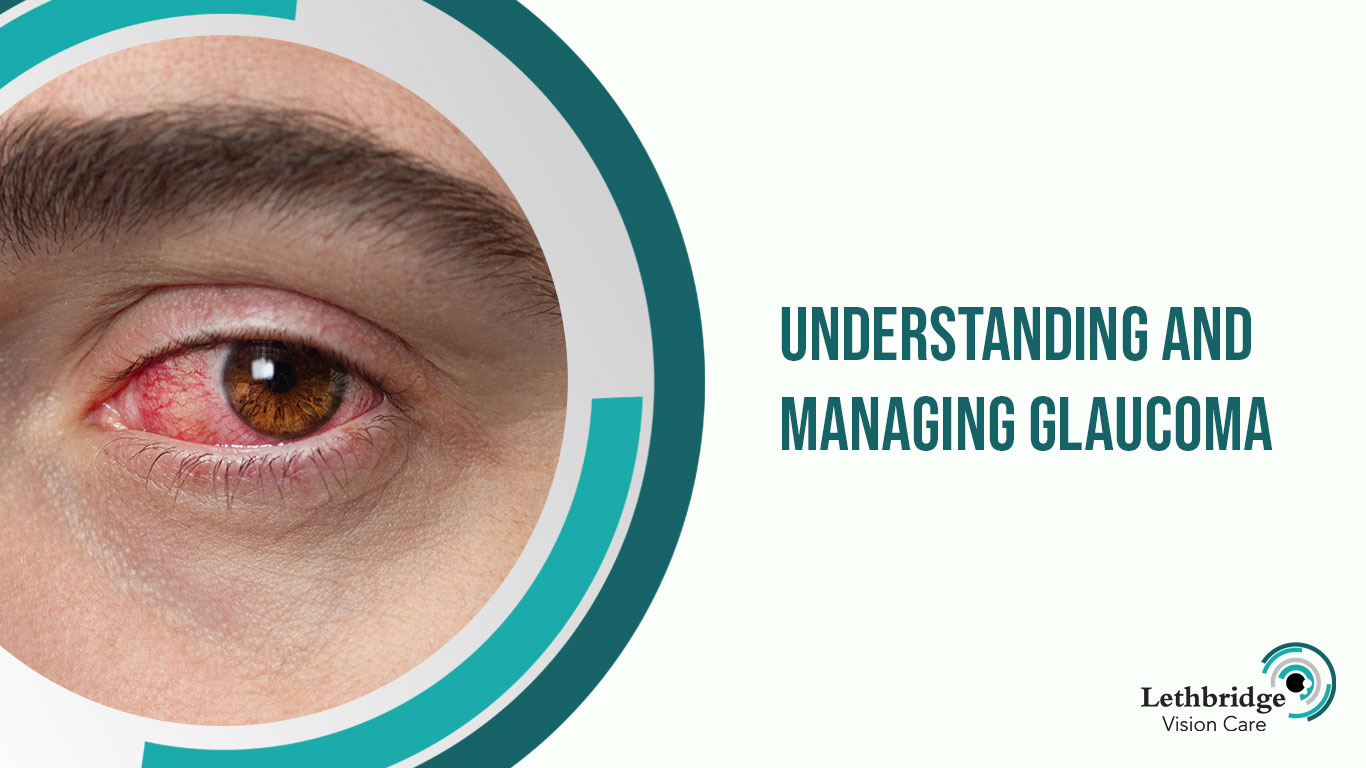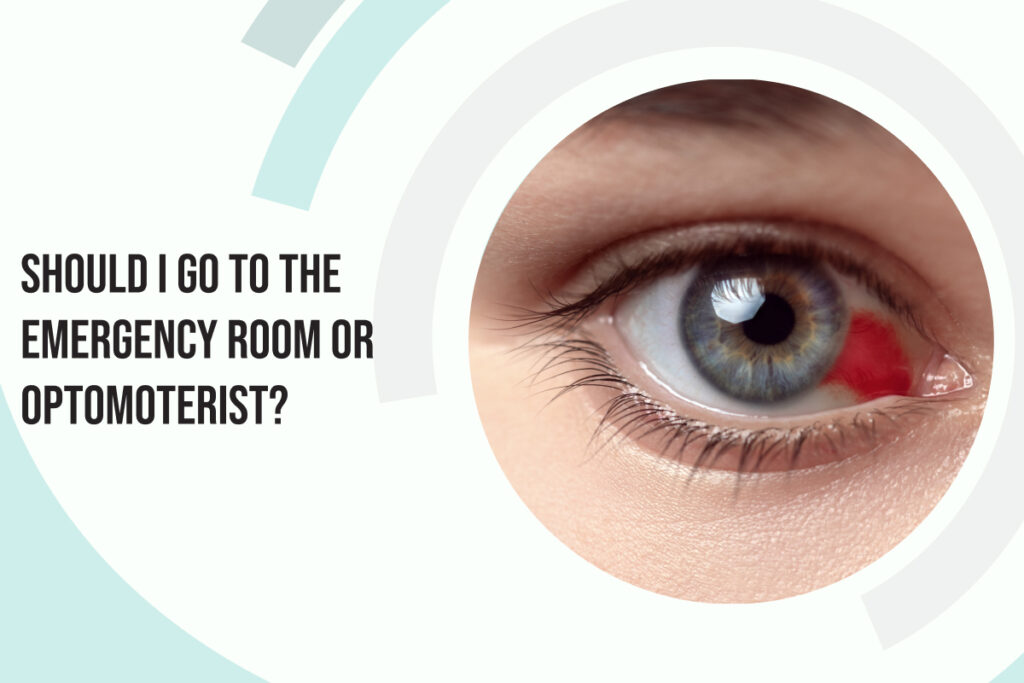Glaucoma is a major concern in eye health. It is a scary disease that can onset quickly and lead to vision loss without any apparent symptoms in its early stages. As one of the leading causes of blindness worldwide, glaucoma requires vigilant management and early detection to preserve vision and quality of life.
At Lethbridge Vision Centre, we emphasize the importance of understanding glaucoma and taking proactive measures to manage it effectively. If you are worried you may be at a greater risk of glaucoma or just want to gain peace of mind, we offer insights and comprehensive vision exams so you can protect yourself!
What is Glaucoma?
Glaucoma is a group of eye conditions that damage the optic nerve, vital for good vision. This damage is often caused by abnormally high eye pressure, although it can occur even with normal eye pressure. The optic nerve damage typically results in gradual vision loss, starting with peripheral vision.
Types of Glaucoma
Open-Angle Glaucoma: The most common form, where the drainage angle formed by the cornea and iris remains open, but the trabecular meshwork is partially blocked, causing a slow increase in eye pressure.
Angle-Closure Glaucoma: This occurs when the iris bulges forward to narrow or block the drainage angle formed by the cornea and iris. This can lead to a sudden buildup of pressure within the eye, requiring immediate medical attention.
Normal-Tension Glaucoma: Damage to the optic nerve occurs even though eye pressure remains within the normal range. The exact cause is unknown, but it is thought to be due to a sensitive optic nerve or reduced blood flow to the nerve.
Congenital Glaucoma: This rare type occurs in infants and is caused by an abnormal eye drainage system development.
Prevalence and Risk Factors
Glaucoma affects millions of people worldwide, and several factors increase the risk, including:
- People over 60 are at higher risk.
- A family history of glaucoma increases your risk.
- Conditions like diabetes, heart disease, and high blood pressure can increase risk.
- Severe eye injuries, prolonged use of corticosteroids, and thin corneas also contribute to higher risk.
Symptoms and Diagnosis
Glaucoma often has no symptoms in its early stages, making regular eye exams crucial. As the disease progresses, symptoms may include:
- Loss of Peripheral Vision: Often noticed first in both eyes.
- Eye Pain: Can occur suddenly, especially in angle-closure glaucoma.
- Halos Around Lights: Seeing halos around lights can be a symptom.
- Redness in the Eye: Along with other symptoms, can indicate acute angle-closure glaucoma.
- Nausea and Vomiting: Accompanied by severe eye pain.
Regular eye exams are essential for early detection of glaucoma. Early diagnosis and treatment can prevent severe vision loss. Lethbridge Vision Centre recommends comprehensive eye exams that include:
Visual Field Test: To check for areas of vision loss.
OCT Imaging (Optical Coherence Tomography): To obtain detailed images of the optic nerve and retina.
Tonometry: To measure the pressure inside the eye.
Gonioscopy: To examine the drainage angle of the eye.
Treatment Options
While glaucoma cannot be cured, its progression can be slowed or halted with appropriate treatment. Treatment options include medications, laser treatments, and surgery.
Medications
Eye Drops: The first line of treatment to reduce intraocular pressure. They work by either decreasing the amount of fluid produced in the eye or improving its drainage.
Oral Medications: Sometimes prescribed if eye drops are not sufficient. These medications reduce eye pressure by improving fluid outflow or reducing fluid production.
Laser Treatments
Laser Trabeculoplasty: Used to treat open-angle glaucoma, this procedure helps drain fluid from the eye, lowering pressure.
Iridotomy: Often used for angle-closure glaucoma, this procedure creates a small hole in the iris to improve fluid flow within the eye.
Surgical Options
Trabeculectomy: A surgical procedure that creates a new drainage pathway for the eye fluid.
Glaucoma Drainage Devices: Implants that help drain fluid from the eye.
Minimally Invasive Glaucoma Surgery (MIGS): Newer, less invasive procedures that help reduce eye pressure.
Each treatment has benefits and potential side effects, which should be discussed with an optometrist to determine the best approach for each patient.
Lifestyle and Home Care
Effective glaucoma management extends beyond medical treatments. Lifestyle and home care play a critical role:
- Adherence to Prescribed Treatments: Consistently using medications as prescribed is vital to control eye pressure.
- Healthy Diet and Regular Exercise: Eating a balanced diet and engaging in regular physical activity can benefit overall eye health.
- Protecting Eyes from Injury: Wearing protective eyewear during activities that pose a risk of eye injury.
Regular follow-up appointments with an optometrist are crucial to monitor the condition and adjust treatments as needed. Lethbridge Vision Centre provides personalized care plans to ensure the best outcomes for patients.
Advancements in Glaucoma Management
Technological advancements are continuously improving the detection and treatment of glaucoma. Innovations such as advanced imaging techniques and minimally invasive surgical options offer new hope for patients. Staying informed about the latest research and clinical trials can provide access to cutting-edge treatments and improve management outcomes.
Preventative Measures
While some risk factors for glaucoma are beyond control, certain measures can reduce the risk:
- Regular Eye Exams: Especially important for those over 60, with a family history or other risk factors.
- Family History and Genetic Counseling: Understanding family history can help in early detection and management.
- Healthy Lifestyle Choices: Maintaining a healthy lifestyle can reduce overall risk.
Understanding and managing glaucoma is critical to preserving vision and maintaining a high quality of life. Regular eye exams, early detection, and adherence to treatment plans are essential. Lethbridge Vision Centre is dedicated to providing comprehensive eye care services to help patients manage glaucoma effectively.
Don’t wait until it’s too late. Contact Lethbridge Vision Centre for more information or to book an appointment. We are here to help you maintain healthy vision and manage glaucoma effectively.







